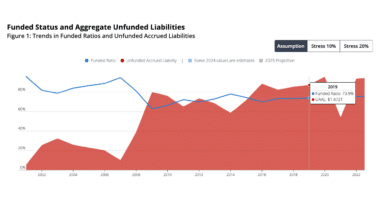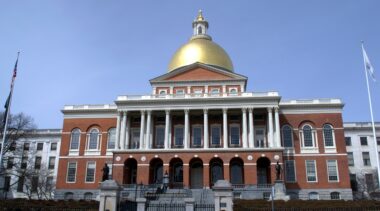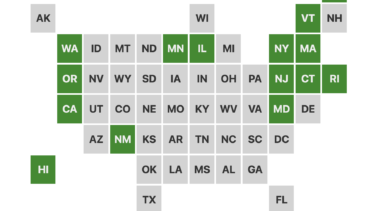Jordan Campbell is managing director of government finance and senior quantitative analyst at Reason Foundation.
Prior to joining Reason, Campbell worked at a marketing analytics firm building econometric models. Before starting his analytics career, he was a policy and research assistant at the Charles Koch Institute.
Campbell’s work has been published by The Press-Enterprise and the Platte Institute. His quantitative work on educational policy has been cited by The Thomas B. Fordham Institute.
Recently, Campbell appeared on a panel entitled “Don’t Fence Me In: Texans Crossing School Boundaries” sponsored by the Texas Public Policy Foundation.
Campbell received his bachelor’s degree from Portland State University and a master’s degree in quantitative economics from California Lutheran University.
He lives with his wife in Los Angeles.
-
Why teacher salaries are stagnant
That teachers’ wages have stagnated over two decades of growth in public school funding highlights deep structural problems in K–12 finance.
-
State and local governments are drowning in debt
To address this mountain of debt and restore fiscal stability, state and local governments must sustainably align spending with revenues.
-
Examining the latest K-12 public school enrollment data and trends
Nationwide, public school enrollment has fallen by 1.28 million students since the start of COVID-19.
-
With additional plans reporting, total unfunded public pension liabilities in the U.S. grow to $1.61 trillion
Information added to the Annual Pension Solvency and Performance Report finds the median funded ratio across public pension plans decreased marginally to 75.8%.
-
Public school closures were on the upswing in 2024
In the 15 states examined, public school closures increased in 2023-24.
-
Annual pension solvency and performance report
At the end of the 2023 fiscal year, the nation's public pension systems had $1.59 trillion in total unfunded liabilities.
-
Four takeaways from the U.S. Census Bureau’s latest school finance data
With federal data from the 2022 school year now available, policymakers can better grasp how the COVID-19 pandemic affected public school budgets.
-
For most workers, the value of Alaska’s defined contribution plan surpasses that of a traditional pension
The following tool created by the Pension Integrity Project displays the year-by-year accrual of retirement benefits for a wide variety of Alaska workers in different fields and starting at different ages.
-
Public pension systems continue to support ESG proposals
The public should be able to view proxy votes well before they are cast and access annual reports showing all of a pension plan’s proxy votes.
-
Calls for public pension systems to divest from energy sector are shortsighted
Public pension systems have a fiduciary duty to make investment decisions in the best financial interest of their members.
-
Homeschooling is on the rise, even as the pandemic recedes
As of May 2023, 85% of students are enrolled in public schools, 9.6% attend private schools, and 5.4% are homeschooled.
-
Vanguard’s shift away from ESG fits with its focus on low fees
“Our research indicates that ESG investing does not have any advantage over broad-based investing.”
-
The effect of menthol bans on cigarette sales: Evidence from Massachusetts
Massachusetts' flavored tobacco ban primarily sent buyers to other states and illicit markets.
-
The mechanics of ESG-driven divestment, engagement and proxy voting
It is inappropriate for public pension systems to engage in political, non-pecuniary investment activities, regardless of whether it occurs through divestment or shareholder proposals.
-
Scrutinizing high ESG fees, greenwashing and the politicization of public pension funds
ESG-focused investing is drawing criticism, even from some supporters, due to overstated claims and high fees.
-
The public pension systems signing on to politicized ESG investment efforts
State and local public pension systems that have signed on to the Ceres Investor Network on Climate Risk and Sustainability and Climate Action 100+.
-
California’s public schools are losing kids while getting more money
Even though there are fewer kids in public schools, the state’s education spending continues to go up.
-
The difficulties of assigning ESG ratings
The problems with public pension systems and private companies trying to create environmental, social, and corporate governance (ESG) risk ratings.


















